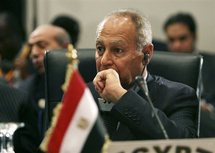
Ahmed Abul Gheit
"The goal is to achieve the Palestinian demand, which has Arab support, for a complete halt to settlements in order to clear the way for a return to negotiations," Abul Gheit told reporters after meeting with Abbas in Ramallah.
"We are still working with the Americans and the Israelis, but until now there has not been the desired breakthrough."
Abbas told the same news conference he was still mulling alternative paths to statehood, including an appeal to the United Nations, but said his first choice would be to return to the negotiations launched in September.
"We have discussed our options and we have said that these are consecutive options, but our first option is to return to direct negotiations if Israel halts all settlement activity," Abbas said.
Israeli Prime Minister Benjamin Netanyahu later reiterated his opposition to the Palestinians going to the United Nations.
"We expect the Palestinians to fulfil their obligations and negotiate directly, seriously, in good faith and without preconditions," his office quoted him as saying.
"Any attempt to circumvent the process and go to international organisations will not lead to progress in a true peace process," Netanyahu said, adding he hoped to return to talks soon.
The two senior Egyptian officials had flown by helicopter from Amman, where they met with Jordan's King Abdullah II, who also called for a settlement freeze.
"Unilateral and provocative actions, particularly settlement building, should stop in order to create the right environment for the talks," the king said, according to a palace statement.
"More international and regional efforts are needed to achieve progress in efforts seeking to end the Palestinian-Israeli conflict. Failure will create more tension and violence in the Middle East," he warned.
Later, Netanyahu, meeting with visiting US Senator Joe Lieberman, played down the importance of ongoing settlement construction.
"We have to get past the current obstacle placed by the Palestinians, which is not fundamental to any agreement because the building in Judea and Samaria will not affect the final peace map," Netanyahu said, referring to the West Bank by its biblical names.
After more than a year of US-led shuttle diplomacy, the latest round of direct talks was launched in Washington early last month in the presence of US President Barack Obama, Egyptian President Hosni Mubarak and King Abdullah.
But the negotiations ground to a halt three weeks later when a 10-month partial moratorium on settlement construction in the West Bank expired.
Arab foreign ministers have given Washington until early November to resolve the impasse before they meet to discuss alternatives to the negotiations, but there has been little sign of progress in recent weeks.
The Palestinians view the presence of 500,000 Israelis in more than 120 settlements scattered across the occupied West Bank, including annexed east Jerusalem, as a major obstacle to the establishment of their promised state.
Israel has so far refused to renew the moratorium and insisted the thorny issue of Jewish settlements be resolved as part of a final peace deal.
------------------------------------------------------------------------------------
"We are still working with the Americans and the Israelis, but until now there has not been the desired breakthrough."
Abbas told the same news conference he was still mulling alternative paths to statehood, including an appeal to the United Nations, but said his first choice would be to return to the negotiations launched in September.
"We have discussed our options and we have said that these are consecutive options, but our first option is to return to direct negotiations if Israel halts all settlement activity," Abbas said.
Israeli Prime Minister Benjamin Netanyahu later reiterated his opposition to the Palestinians going to the United Nations.
"We expect the Palestinians to fulfil their obligations and negotiate directly, seriously, in good faith and without preconditions," his office quoted him as saying.
"Any attempt to circumvent the process and go to international organisations will not lead to progress in a true peace process," Netanyahu said, adding he hoped to return to talks soon.
The two senior Egyptian officials had flown by helicopter from Amman, where they met with Jordan's King Abdullah II, who also called for a settlement freeze.
"Unilateral and provocative actions, particularly settlement building, should stop in order to create the right environment for the talks," the king said, according to a palace statement.
"More international and regional efforts are needed to achieve progress in efforts seeking to end the Palestinian-Israeli conflict. Failure will create more tension and violence in the Middle East," he warned.
Later, Netanyahu, meeting with visiting US Senator Joe Lieberman, played down the importance of ongoing settlement construction.
"We have to get past the current obstacle placed by the Palestinians, which is not fundamental to any agreement because the building in Judea and Samaria will not affect the final peace map," Netanyahu said, referring to the West Bank by its biblical names.
After more than a year of US-led shuttle diplomacy, the latest round of direct talks was launched in Washington early last month in the presence of US President Barack Obama, Egyptian President Hosni Mubarak and King Abdullah.
But the negotiations ground to a halt three weeks later when a 10-month partial moratorium on settlement construction in the West Bank expired.
Arab foreign ministers have given Washington until early November to resolve the impasse before they meet to discuss alternatives to the negotiations, but there has been little sign of progress in recent weeks.
The Palestinians view the presence of 500,000 Israelis in more than 120 settlements scattered across the occupied West Bank, including annexed east Jerusalem, as a major obstacle to the establishment of their promised state.
Israel has so far refused to renew the moratorium and insisted the thorny issue of Jewish settlements be resolved as part of a final peace deal.
------------------------------------------------------------------------------------









 Home
Home Politics
Politics









